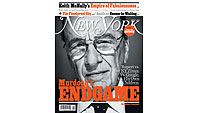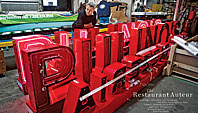
1. Rupert Murdoch’s wars are first-rate spectator sports, and Gabriel Sherman’s profile of the aging mogul (“The Raging Septuagenarian,” March 8) piqued the interest of a wide spectrum of readers, from tech geeks to journalists to those hungry for information on which Murdoch offspring is currently in favor. “A very, very good piece … about where Rupert is right now in the arc of his wonderful, predatory, swashbuckling media career,” said Tina Brown, editor of the Daily Beast, on NPR’s “Morning Edition.” The article was the talk of Twitter, with readers offering terse praise such as, “Great article on the man who wants to take on Google.” Michael Wolff, who spent significant time in the News Corp. trenches while writing his biography of Murdoch, tweeted: “Good NYmag piece on Murdoch but misses RM’s weird vagueness and scary impulsiveness.” Over at Politico, blogger Ben Smith found that the profile “comes off gentler than expected,” but was pleased with the “entertaining trash talk from Wall Street Journal executives.” Other readers zeroed in on Murdoch’s vision of transforming The Wall Street Journal into a Times-slayer. “Producing a competing paper that’s more like the Times may in fact be the best thing that could happen to the Times,” argued Michael Roston at True Slant. “Having a serious competitor in New York and around the world for ‘paper of record’ should make the Times a leaner, meaner institution, more capable of staying up on its own feet.” And at Slate’s The Big Money blog, Marion Maneker highlighted Sherman’s “succinct and lucid” summation of the changes at the Journal, taking the paper to task for retreating from the longer business stories for which it is famous. “It is a bizarre turn of events,” he wrote, “to see the Journal’s competitive advantage dismantled precisely when it was becoming the most valuable.”

2. Benjamin Wallace’s profile of the exceedingly successful (yet chronically pessimistic) restaurateur Keith McNally (“The Restaurant Auteur ,” March 8) inspired praise from faithful diners. “Whatever he does,” wrote one commenter on nymag.com, “the formula works for me, and I know I will love his newest venture. I hope he is around to open many more restaurants.” But not everyone was buying McNally’s humble-genius line. “I am a fan of McNally’s restaurants but have suffered the indignity of taking the 5:30 Minetta reservation several times,” wrote a commenter. “He definitely buys into the ‘important people’ shtick more than many restaurateurs. I understand how it’s important for his business and fairly rampant in the industry but that doesn’t make it any less obnoxious.” Others posted rebuttals and praised his influence on the city. “What McNally does, he does very, very well and the city is a better place for it,” argued one fan. “The man understands the psychology of eating, and realizes that nutrition and even taste are secondary and even tertiary to the experience of ‘going out.’ McNally gives all his patrons the opportunity to be the stars in their own movies.”
3. In a week in which coyotes remained at large in Manhattan despite attempts by city authorities to hunt them down, the commenters and bloggers who wrote about Robert Sullivan’s encounter in Central Park (“J. D. Coyote,” March 8) are definitely on the side of the coyote. “More coyotes will certainly come to Central Park to fill the vacancy left by the ones the DEC wants to remove. Teach tolerance, not intolerance. The coyotes will help control the rat, mouse, and raccoon populations. Leave them alone!” pleaded one commenter. The blog Animal Tourism hopes Sullivan’s article will rally public support: “New Yorkers may not want a coyote hanging around Sheep Meadow, but they don’t want him shot for nothing, either.”
4. Commenters took Lizzy Goodman’s picks of 40 quintessential New York songs (“The Vulture Pages: The Ultimate New York Playlist,” March 8) and ran with it. A sampling of their additions: “Nas’s ‘New York State of Mind’ had such an effect on me as a kid—the imagery he painted was so vivid” … “Interpol’s ‘NYC’ ” … “Don Henley’s ‘New York Minute’ ” … “How about the entire New York album by Lou Reed?” … “ ‘Chelsea Hotel #2,’ by Leonard Cohen” … “For an instrumental or ballet, ‘Slaughter on 10th Avenue’ ” … “The Dictators’ ‘New York, New York’ ” … “ ‘New York City,’ John Lennon” …“ ‘Teenage Riot,’ Sonic Youth” … “Practically everything by Tom Waits” … “Okay, I know you were all born after 1989, but didn’t you ever hear of Duke Ellington’s ‘Take the “A” Train’?”
5. Last Thursday, an item in “Page Six” noted, “No one was more upset by Harold Ford Jr.’s decision not to run for Kirsten Gillibrand’s U.S. Senate seat than Michael Crowley,” suggesting that a “testy” exchange between Crowley and Ford’s press representative came as a result of Crowley’s frustration that Ford had abandoned the race. In fact, the admittedly contentious conversation took place 48 hours before even Ford himself knew he would decide not to run. Crowley’s analysis of Ford’s protocampaign can be found here.
Send correspondence to: [email protected]